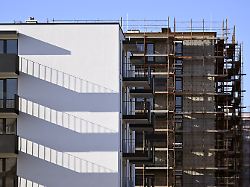Study sees acceleration
“No end in sight” for rent increases in major cities
7/25/2023 7:56 am
Many people can no longer afford to buy real estate due to the rise in interest rates and are switching to rented apartments. This drives up rents – especially in the coveted big cities. A study sees major problems in Berlin in particular.
High demand for living space, sluggish new construction, hesitant real estate buyers: According to a new study, the pressure on the rental market in German cities has increased. In the first half of the year, asking rents in Berlin, Hamburg, Munich, Cologne, Frankfurt, Dusseldorf, Stuttgart and Leipzig rose by an average of 6.7 percent, according to an analysis by real estate specialist Jones Lang LaSalle (JLL). In the same period of the previous year, the increase in rents was still 3.7 percent.
The momentum in the metropolises has recently been stronger than in urban districts: there, asking rents for new buildings and existing apartments have risen by 2.7 percent within twelve months. Advertised rents in the districts climbed by 4.9 percent. Asking rents increased particularly strongly in Berlin and Leipzig, where, according to the study, double-digit percentage increases were recorded. In Berlin, there was a net immigration of 86,000 people in 2022, while just over 17,000 apartments were completed, JLL explained. The Berlin housing market is getting tighter and tighter. Rent increases were much more moderate in the other major cities, and advertised rents even fell slightly in Stuttgart.
Asking rents do not yet mean a deal, sometimes the agreed rent deviates from this – but this is less common than when buying a property. “In all of the metropolises considered, there is an enormous shortage of supply, which will be exacerbated by the faltering housing construction,” said JLL residential real estate expert Roman Heidrich. “There is therefore no end in sight to the rent increases.”
Buying is cheaper in big cities – except in Berlin
Pressure also comes from increased interest rates on loans, which are preventing prospective buyers from buying real estate and pushing them into the rental market, it said. The study also shows how expensive housing is in the eight major cities. Rental apartments there were offered at an average of 15.38 euros per square meter, around 50 percent more expensive than in urban districts (10 euros) and 79 percent more expensive than in the rural districts (8.61 euros).
Meanwhile, purchase prices for new buildings and existing apartments remained under pressure. According to JLL, asking prices fell by 7 percent in the first half of the year, compared to an increase of 7.5 percent in the same period last year. While residential real estate in Berlin has become slightly more expensive, there have been significant declines in all other metropolises – most notably in Munich, Stuttgart and Düsseldorf. In the metropolises, prices had risen sharply during the long real estate boom. According to JLL, prices recently fell significantly less in the urban districts (-5.2 percent) and rural districts (-2.2 percent).
Offer prices do not provide precise information about the actual purchase price. “The property market reports of the expert committees, for which real purchase cases are evaluated, sometimes show significantly higher price reductions,” said JLL expert Sebastian Grimm. Residential real estate prices in Germany have been falling for months. According to the Federal Statistical Office, they fell by 6.8 percent in the first quarter compared to the same quarter of the previous year. Figures for the second quarter are still pending.
